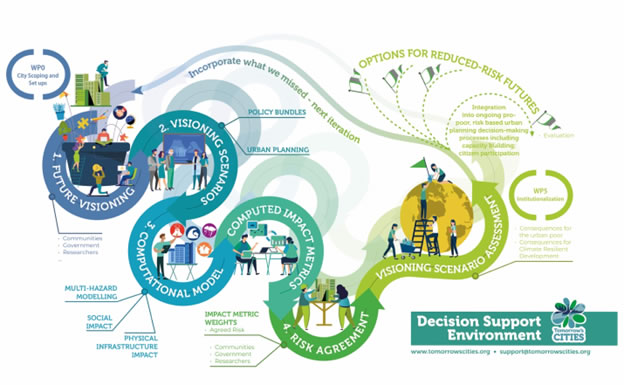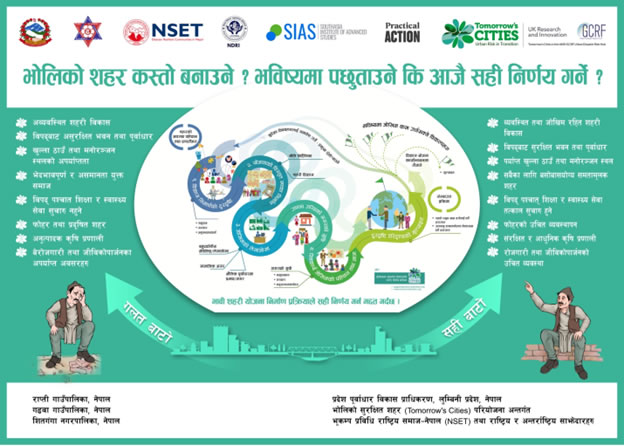Tomorrow's Cities (UKRI GCRF: Urban Disaster Risk Hub)
Supporting Agency: UK-GCRF/DFIDGeneral Information
Tomorrow’s Cities is the UK Research and Innovation (UKRI) Global Challenges Research Fund (GCRF) Urban Disaster Risk Hub—a five-year global interdisciplinary research hub - one of 12 UKRI GRCF Hubs funded through a UKRI Collective Fund award, as part of the UK AID strategy to put research at the heart of efforts to deliver the United Nation’s Sustainable Development Goals (SDGs).
The program’s mission is to reduce disaster risk for the poor in tomorrow’s cities.
Tomorrow’s Cities aims to catalyse a transition from crisis management to multi-hazard risk-informed planning and decision-making, for cities in low-and-middle-income countries.
Grant Holder: Prof. Hugh Sinclair
Organization: University of Edinburgh, UK
Program duration: 2019 – 2024
NSET contributes as a international team member for the project implementation and leads the capacity strengthening component of has been involved to implement Tomorrow’s Cities project activities, Tomorrow’s Khokana City in the southern part of Kathmandu valley, and Tomorrow’s Rapti Valley (Deukhuri) Capital City of Lumbini Province in Nepal. NSET is also coordinating for the project implementation in 2 cities in Bangladesh; Chattogram and Cox’s Bazar.
Tomorrow’s Khokana City
Located in a wide valley at the heart of the Himalayas, Kathmandu’s unique setting makes it prone to multiple hazards, including earthquakes, landslides and monsoon floods.
Rebuilding and recovery from the most recent major disaster, the 2015 Gorkha earthquake, is still ongoing throughout the city and peripheral settlements. Meanwhile, the trend of rapid upward and outward urban expansion continues, often uncontrolled, and is leading to a mix of diverse low-income communities and a reduction of open spaces and agricultural fields. This is driving an increase in the number of vulnerable communities exposed to multi-hazard risks, and compounds wider social, economic and environmental challenges.
Kathmandu’s political and governance landscape is also changing. In 2008 Nepal underwent a shift from a Hindu monarchy to a federal republic, leading to a transition in governance structures and institutes. The new government is setting the agenda for rapid urbanisation across the country with four new ‘smart satellite cities’ for the Kathmandu Valley. This will be delivered by numerous ministries through the ‘Integrated Urban Development Plan’ and the coordinating ministry, the Ministry of Urban Development, is seeking to integrate disaster risk reduction concerns within its plans.
Kathmandu Hub
• Tribhuvan University, Institute of Engineering
• National Society for Earthquake Technology – Nepal (NSET)
• South Asia Institute of Advanced Studies (SIAS)
• Practical Action Nepal
• Nepal Development Research Institute (NDRI)
Key stakeholders
• National Disaster Risk Reduction and Management Authority (NDRRMA),
• Department of Hydrology and Meteorology (DHM),
• Municipal DRRM Committee, Ward level DRRM Committee,
• Disaster risk Management Committees,
• Provincial DRRM Committees,
• NGOs
Tomorrow’s Cities Decision Support Environment (TCDSE)

The work packages of the project are modelled around the Tomorrow’s Cities Decision Support Environment (TCDSE), which is a framework for modelling people-centred future natural hazard risk helping communities and the government to make a risk informed decision for planning of future cities.
Work Packages
• WP0: City scoping and set-up
• WP1: Future Visioning
• WP2: Visioning Scenario Implementation
• WP3: Multi-hazard Social and Physical Impact Assessments
• WP4: Risk Agreement
• WP5: Institutionalizing the DSE
Tomorrow’s Rapti City
The Provincial Government and Local Governments are collaborating to develop the Lumbini Provincial Capital City (LPCC), also known as Rapti City.
The Provincial Infrastructure Development Authority (PIDA) is leading the process of creating a Master Plan and overseeing the construction of the new city. PIDA is an autonomous organization established by the council of ministers in Lumbini Province to implement important infrastructure projects identified and prioritized by the Province.
The primary goal of PIDA is to fast-track the implementation of these projects, which will significantly contribute to the development of the Province. PIDA aims to effectively mobilize public, private, and external investors for the infrastructural development of the LPCC, or Rapti City.
Lumbini Provincial Capital City (LPCC), Rapti, is situated in the mid-western part of the country, nestled at the foothills of the Chure mountains. The region is traversed by the Rapti River, flowing centrally through the Deukhuri Valley. LPCC was formed by merging the areas of Rapti Rural Municipality, Gadhawa Rural Municipality, and Shitaganga Municipality, encompassing a total area of approximately 480 sq.km.
The region has a diverse topography comprising hills, plains, undulations, and rivers. While the plain area extends along the banks of the West Rapti River, the hills encircle it on three sides, except for the west.
The population of Rapti City is around 68,615, distributed across several wards and ethnic groups, with the majority being Tharu in Gadhawa Rural Municipality and Brahmin and Chhetri in Rapti Rural Municipality, along with Magar and Kumal communities.
Rapti faces multiple natural hazards, including seismic activity, floods, landslides, and fires.
What can Tomorrow’s Cities bring to Rapti?
The Provincial Infrastructure Development Authority (PIDA) recognized the advantages of collaborating with Tomorrow's Cities to ensure the future Rapti City is resilient to disasters. We have agreed to work together to incorporate the Tomorrow's Cities Decision Support Environment into the development of the Lumbini Provincial Capital City (LPCC) in the Rapti Valley.
This collaboration aims to leverage the expertise and resources of both entities to implement effective strategies and measures that will contribute to the overall resilience and sustainability of the LPCC in the face of potential hazards and challenges.

Key stakeholders
City Stakeholders
• Provincial Infrastructure Development Authority (PIDA), Lumbini Province, Nepal
• Rapti Rural Municipality (RRM)
• Gadhwa Rural Municipality (GRM)
• Shitaganga Municipality (ShM)
Local Research Team
• Centre for Disaster Studies, Institute of Engineering, Tribhuvan University (CDS/IOE/TU)
• National Society for Earthquake Technology-Nepal (NSET)
• Southasia Institute for Advance Studies (SIAS)
• Practical Action Nepal (PA)
• Nepal Development Research Institute (NDRI)
Role of NSET in the Project
• WP1: Co-ordination in Municipal level engagements and support social interactions to other Kathmandu Partners
• WP2: Detailing of the Landuse Plan prepare three scenarios with Building Infrastructure information complete with structural and household level information
• WP3: Support Multi Hazard studies specially on earthquake hazard, Fragility functions for Building Infrastructure and Social Impact studies
• WP4: Co-ordination with other TC partners within Kathmandu Hub: NSET, SIAS, IOE, PA Discussing the outcome scenarios of WP1, WP2 and WP3 and present the calculated risk for Risk Agreement in the community
• Capacity Strengthening: Lead activities under the capacity strengthening work package in a co-produced approach
• Monitoring and Evaluation: Support development of monitoring and evaluation framework
• TCDSE Implementation in Rapti, the capital city of Lumbini Province in Nepal
• TCDSE Implementation in Chattogram and Cox's Bazar in Bangladesh
• Project's Communication Lead for Rapti, Chattogram and Cox's Bazar
• Project's Website Host and Operation
• Work as Legacy Partner for Tomorrow's Cities project in the future
View Infographics













